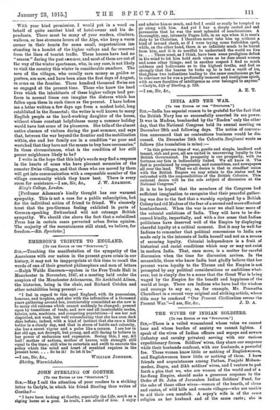INDIA AND THE WAR.
[To TO EDITOS ON VIII SPICTATOIL"] bas especial reason to be grateful for the fact that the British Navy has so successfully asserted its sea power. It was in Madras, bombarded by the ' Emden' only the other day, that the National Congress held its annual meeting on December 28th and following days. The notice of convoca- tion announced that no contentious business would be dia. cussed. On December 24th the Calcutta Sanjivani wrote as follows (the translation is mine) "In this grievous time of war, gentle and simple, landlord and tenant, rich and poor, all are united in unswerving loyalty to the British Government. Its prosperity is our prosperity, with its fortunes our fate is indissolubly linked. We all know it. The fact is proclaimed by congresses, and committees, and newspapers all over the land. What we all desire is that in steadfast union with the British Empire we may attain to the status and be entrusted with the responsibilities of the British Colonies. This national desire will be the sole subject of discussion at the National Congress."
It is to be hoped that the members of the Congress had sufficient imagination to recognize that their peaceful gather- ing was due to the fact that a warship equipped by a British Colony had rid Madras of the fear of a second and more effectual bombardment. When the war is over we shall hear more of the colonial ambitions of India. They will have to be dis- cussed kindly, impartially, and with a due sense that Indian politicians have deserved well of the Empire by displaying cheerful loyalty at a critical moment. But it may be well for Indians to remember that political concessions to India are made only M. the interests of India herself and not as a means of securing loyalty. Colonial independence is a fruit of historical and racial conditions which may or may not exist in modern India. That, once more, is a matter for careful discussion when the time for discussion anives. In the meanwhile, those who know India best gladly believe that her present warm loyalty to the Throne and the Empire is not prompted by any political considerations or ambitions what- ever, but is simply due to a sense that the Great War is being waged by the Empire for the benefit and happiness of the world at large. There are Indians who have had the wisdom and courage to say so; as, for example, Mr. Pmmatha Chaudhuri in a recent very original and striking article, whose title may be rendered "Our Present Civilization versus the
Present War."—I am, Sir, Ac., J. D. A.


































 Previous page
Previous page